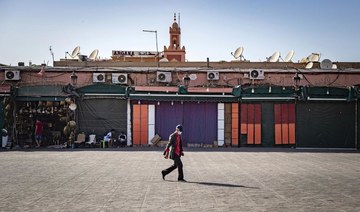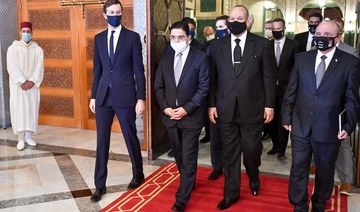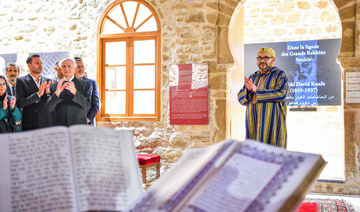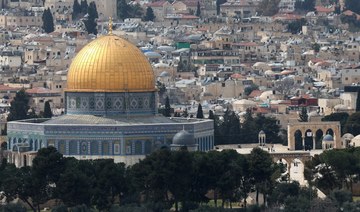RABAT: Morocco announced it has acquired 65 million doses of COVID-19 vaccines from China’s Sinopharm and Britain’s AstraZeneca, as the north African kingdom prepares to launch a COVID-19 vaccination program that aims to immunize 80 percent of the country’s adult population.
Health Minister Khalid Ait Taleb announced the figure at a Cabinet meeting Thursday. The government did not indicate whether the vaccines were purchased or provided by Covax, the global project to provide vaccines to developing countries, or a combination of both.
His ministry said Friday that Morocco has not yet received the vaccines.
Mustapha Ennaji Moulay, head of the virology department at the Hassan II University in Casablanca and a member of the government’s COVID-19 scientific committee, said that regulators are reviewing the Sinopharm vaccine’s documentation, and that the vaccination program is expected to begin in the coming days.
Morocco has one of the most advanced vaccination plans in the region. The country has also reported the second-highest number of virus infections and deaths in Africa, after South Africa.
The Moroccan health minister said the government’s target is vaccinating 25 million of the country’s 36 million people, all free of charge, according to orders from King Mohammed VI.
While the Moroccan government has been promising vaccinations since earlier this month, the minister said preparations have now reached a “very advanced” stage. He said authorities were carrying out simulations at all the immunization sites “to avoid any obstacles that may arise during the implementation of the vaccination program.”
In a first phase, the vaccine will be administered to medical personnel, public authorities, security services, education workers and people suffering from chronic diseases. The Ministry of Health said it has deployed a computerized system to register the target population and track their health status after they receive the vaccine.
Moulay said Morocco has sought to diversify supply by signing contracts with multiple countries.
Morocco has said it will start its vaccination program with the Sinopharm vaccine, though it hasn’t yet completed advanced trials to prove that it’s safe and effective. The vaccine, which was tested on 600 Moroccans as part of clinical trials this autumn, has been approved for emergency use in a few countries and the company is still conducting late-stage clinical trials in multiple countries.
Morocco’s initial vaccine deliveries will come from China, but Morocco also plans to produce the vaccine locally.
The AstraZeneca vaccine is still in advanced trials in countries including Britain and the US and hasn’t been approved yet.
Morocco’s daily virus case count has fallen slightly in the last two weeks, but a dip in testing is raising concerns that the virus could be spreading faster than reported.
As a preventive measure to curb the spread of the virus during New Year’s celebrations, authorities banned public and private gatherings, closed restaurants in the country’s main cities, and imposed a curfew that went into effect Wednesday night and is set to last for three weeks.
Morocco acquires 65 million coronavirus vaccine doses from China, UK
https://arab.news/9322g
Morocco acquires 65 million coronavirus vaccine doses from China, UK

- Morocco is preparing to launch vaccination program to immunize 80% of population
- Authorities are already carrying out simulations at all immunization sites
Hamas seeking US guarantees over Gaza ceasefire plan

Mediators Qatar and Egypt said Hamas had responded on Tuesday to the phased ceasefire plan for an end to the eight-month war between Israel and the Palestinian militant group, without giving details.
The plan was made public at the end of May by US President Joe Biden. It includes the gradual release of Israeli hostages held in Gaza and pullback of Israeli forces over two phases, as well as the freeing of Palestinian prisoners, with the reconstruction of Gaza and return of the remains of deceased hostages in a third phase.
The United States has said Israel accepted the proposal, but Israel has not publicly stated this.
The Egyptian sources and a third source with knowledge of the talks said Hamas had concerns that the current proposal does not provide explicit guarantees over the transition from the first phase of the plan, which includes a six-week truce and the release of some hostages, to the second phase, which includes a permanent ceasefire and Israeli withdrawal.
The Egyptian sources said Hamas would only accept the plan if the guarantees were in place, and Egypt was in contact with the US about the demand.
“Hamas wants reassurances of an automatic transition from one phase to another as per the agreement laid out by President Biden,” the third source said.
Hamas and Egyptian authorities did not immediately respond to requests for comment.
When he announced the plan, Biden said that if negotiations to move to the second phase lasted longer than six weeks, the ceasefire would continue as those negotiations were extended.
Hamas said on Tuesday that its “positive” response to the proposal opened a “wide pathway” to reach an agreement.
But an Israeli official speaking on condition of anonymity said Hamas had “changed all of the main and most meaningful parameters,” characterising the group’s response as a rejection of Biden’s proposal for a hostage release.
One non-Israeli official briefed on the matter, who also declined to be identified, said that in its response, Hamas had proposed a new timeline for a permanent ceasefire with Israel and withdrawal of Israeli troops from Gaza, including Rafah.
More than 37,000 Palestinians have been killed in Israel’s offensive in the Gaza Strip, say health officials in the Hamas-ruled enclave.
The war began when Hamas militants attacked Israel on Oct. 7, killing 1,200 people and abducting some 250 others, according to Israeli tallies.
Negotiators from the US, Egypt and Qatar have been trying for months to mediate a ceasefire and free the hostages, more than 100 of whom are believed to remain captive in Gaza.
Gaza families desperate for water with no relief in sight

- Israel’s retaliatory offensive has not only killed more than 37,000 people but created a humanitarian crisis with shortages of food, fuel and medicine as well as water
GAZA: It is not only the ever-present danger from Israeli bombardment or ground fighting that makes life a trial for Gaza’s Palestinian civilians. It is also the sheer daily slog to find bare necessities such as water, to drink or cook or wash with.
For the Shenbary family, that can be a walk of 90 minutes, jerry cans at the ready, in the hope of finding a makeshift distribution point among the mounds of grey, dusty rubble of the Jabalia urban refugee camp in northern Gaza.
“Now that Jabalia has all been bulldozed, all the wells are bulldozed with it. There’s not a single water well left,” family father Ahmed Al-Shenbary said last Saturday. “Water is a big tragedy in Jabalia.”
The war started on Oct. 7 when Hamas, the group ruling Gaza, killed 1,200 people in Israel, according to Israeli tallies, and took another 250 or so to hold as hostages in Gaza, one of the most crowded places on earth.
Israel’s retaliatory offensive has not only killed more than 37,000 people but created a humanitarian crisis with shortages of food, fuel and medicine as well as water in a territory whose housing and infrastructure is now little more than rubble.
“Children and their families are having to use water from unsafe sources that are highly salinated or polluted,” said Catherine Russell, executive director of the UN children’s fund UNICEF.
“Without safe water, many more children will die from deprivation and disease in the coming days.”
People have dug wells in bleak areas near the sea where the bombing has pushed them, or rely on salty tap water from Gaza’s only aquifer, now contaminated with seawater and sewage.
Children walk long distances to line up at makeshift water collection points. Often not strong enough to carry the filled containers, they drag them home on wooden boards.
“As you see, we bathe our children in a small basin. It’s water from washing dishes, not clean water, because of the water shortages,” said Ahmed’s wife Fatima.
She bathes her son on the floor in the concrete shell of a wrecked school that now passes for their latest home after several forced relocations.
“We have hepatitis, which causes yellowing of the eyes,” she said. “We also have intestinal infections — not just me but the whole school ... Even ‘filtered water’ isn’t really filtered. We fool ourselves and pretend.”
Jordan condemns increased incursions by Israeli extremist settlers into Al-Aqsa Mosque

AMMAN: Jordan strongly condemned ongoing and increasing incursions by extremist settlers into Al-Aqsa Mosque – Al-Haram Al-Sharif compound, with the latest incident occurring on Wednesday under the protection of Israeli police.
“These provocative actions within Al-Haram Al-Sharif violate its sanctity and were marked by a significant presence of extremists in the Old City of occupied Jerusalem and at the gates of Al-Haram Al-Sharif, restricting the entry of worshipers into the mosque,” a statement from the Jordanian foreign ministry read.
Jordan is universally regarded as custodian of the holy sites in Jerusalem.
The ministry described such actions as part of “a systematic Israeli policy that blatantly disregards international laws and Israel’s obligations as the occupying power in Jerusalem.”
Ministry spokesperson Sufian Al-Qudah warned that the continuing violations and provocations of the Israeli settlers contravene the established legal and historical status quo in occupied Jerusalem and its holy sites and constitute a violation of international law.
The Al-Aqsa Mosque - Al-Haram Al-Sharif compound, Al-Qudah reiterated, and Israel has no sovereignty over it or over occupied East Jerusalem and its Islamic and Christian holy sites.
The official also stressed the necessity of respecting the authority of the Jerusalem Waqf Administration, affiliated with the Jordanian Ministry of Awqaf and Islamic Affairs, which is the sole authority responsible for managing all affairs of Al-Aqsa Mosque - Al-Haram Al-Sharif and regulating entry into it.
Merchant ship hit in Red Sea off Yemen: security firm

- The ship was hit about 68 nautical miles southwest of the rebel-held port city of Hodeidah
DUBAI: A merchant ship issued a distress call after being struck in the Red Sea off Yemen, a security firm said on Wednesday, in what appeared to be the latest attack by Iran-backed Houthi rebels.
The ship was hit about 68 nautical miles southwest of the rebel-held port city of Hodeidah, maritime security firm Ambrey said.
The company “assessed the vessel aligned with the Houthi target profile at the time of the incident,” it said in a statement, without giving further details.
The Houthis, who are at war with a Saudi-led coalition after ousting the government from the capital Sanaa in 2014, have launched scores of drone and missile attacks on shipping in the Red Sea and Gulf of Aden since November.
They say they are harassing the vital trade route as an act of solidarity with Palestinians during the Israel-Hamas war in the Gaza Strip.
At least 41 people killed in fire in southern Kuwait

- The owner of the impacted building was arrested until investigations are complete
- Kuwait municipality ordered to demolish violating properties without warning the violators.
KUWAIT: At least 41 people were killed in a fire that engulfed a building housing workers in the city of Mangaf in Kuwait’s southern Ahmadi Governorate, Deputy Prime Minister and Minister of Defense Sheikh Fahad Youssef Saud Al-Sabah said on Wednesday.
The owner of the impacted building was arrested until investigations are complete, said Al-Sabah.
“We will work to address the issue of labor overcrowding and neglect,” said Al-Sabah in a statement posted on news state agency KUNA.
Following the massive fire, the municipality has also been ordered to demolish violating properties from tomorrow (Thursday) without warning the violators.
Major General Eid Rashed Hamad from Kuwait police, during a media interview with the Kuwaiti Ministry of Information, said at least 15 of the injured were transferred to nearby hospitals for treatment, including four who were killed in the fire. The figures are not yet final.
#Kuwait Mangaf Fire: Initial causes indicate poor storage on the ground floor and the presence of many gas cylinders, Firefighters, MOI and MOH to assess the deaths and injuries.. #الكويت pic.twitter.com/LNCpkhZdae
— Ayman Mat News (@AymanMatNews) June 12, 2024
According to state news agency KUNA, at least 43 people were hospitalized due to the fire.
The authorities said they had contained the fire and were investigating what caused it.
“We went to the site and the firefighting force controlled the fire, then the inspection began by an emergency team formed for such crises,” Major General Eid Al-Owaihan, the Director of (Forensic Evidence) said, according to a KUNA report quoting Kuwait TV.





















